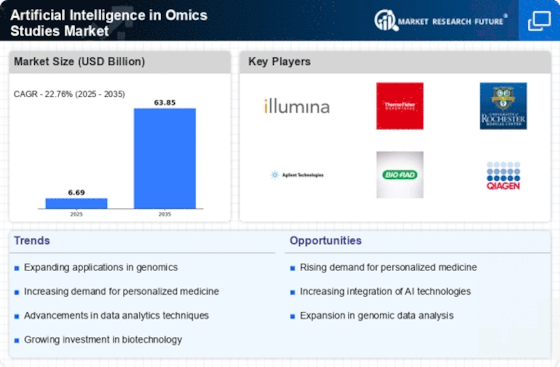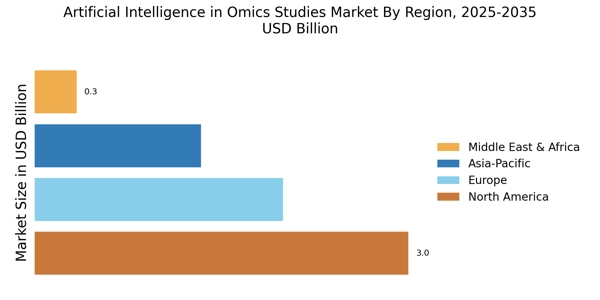Advancements in Data Analytics
The rapid advancements in data analytics technologies significantly influence the Artificial Intelligence in Omics Studies Market. With the exponential growth of biological data generated from genomics, proteomics, and metabolomics, traditional analytical methods often fall short. AI algorithms, particularly machine learning and deep learning, offer sophisticated tools for processing and interpreting complex datasets. This capability is crucial, as it is estimated that the volume of omics data will increase by over 30% annually. As researchers and clinicians seek to derive actionable insights from this data, the reliance on AI-driven analytics is expected to surge, thereby propelling the market forward.
Rising Demand for Precision Medicine
The increasing emphasis on precision medicine is a pivotal driver for the Artificial Intelligence in Omics Studies Market. As healthcare shifts towards personalized treatment plans, the need for advanced analytical tools becomes paramount. AI technologies facilitate the analysis of vast omics data, enabling healthcare professionals to tailor therapies based on individual genetic profiles. This trend is underscored by a projected growth rate of approximately 12% in the precision medicine sector, which directly correlates with the demand for AI-driven omics solutions. Consequently, the integration of AI in omics studies is likely to enhance the efficacy of treatments, thereby improving patient outcomes and driving market expansion.
Increased Investment in Biotechnology
The surge in investment within the biotechnology sector serves as a significant catalyst for the Artificial Intelligence in Omics Studies Market. Venture capital funding and government grants are increasingly directed towards innovative biotechnological research, particularly in omics studies. This influx of capital is likely to foster the development of AI applications that enhance data interpretation and accelerate research timelines. Reports indicate that biotechnology investments have reached unprecedented levels, with a notable increase of 25% in funding over the past year. Such financial backing not only supports the integration of AI technologies but also encourages collaboration among research institutions, further driving market growth.
Growing Need for Efficient Drug Discovery
The quest for more efficient drug discovery processes is a critical driver for the Artificial Intelligence in Omics Studies Market. Traditional drug development is often lengthy and costly, with high failure rates. AI technologies streamline this process by enabling researchers to analyze omics data more effectively, identifying potential drug candidates and biomarkers with greater accuracy. The pharmaceutical industry is increasingly adopting AI-driven approaches, with estimates suggesting that AI could reduce drug discovery timelines by up to 50%. This shift not only enhances the likelihood of successful outcomes but also positions AI as an indispensable tool in modern drug development, thereby expanding its market presence.
Emergence of Collaborative Research Platforms
The emergence of collaborative research platforms is reshaping the landscape of the Artificial Intelligence in Omics Studies Market. These platforms facilitate the sharing of omics data and AI tools among researchers, fostering innovation and accelerating discoveries. By breaking down silos, collaborative initiatives enhance the collective understanding of complex biological systems. The trend towards open science and data sharing is gaining momentum, with numerous institutions and organizations committing to collaborative frameworks. This shift is likely to enhance the application of AI in omics studies, as shared resources and expertise can lead to more robust findings and advancements in the field.


















